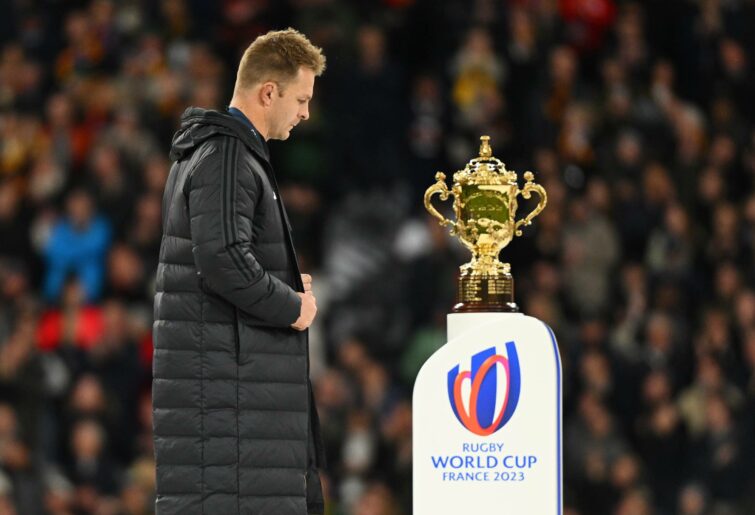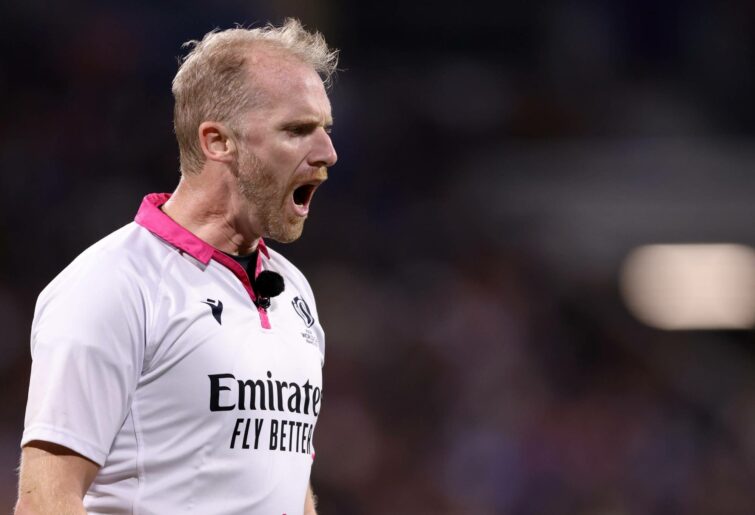So many predictions, so many expectations. The game’s greatest stage, to be graced by perhaps the greatest golden generations of its two greatest nations. Battle-hardened warriors who knew well how to win rugby’s greatest prize, full of quiet determination to experience that addictive feeling one more time.
The ultimate heavyweight contest, the ultimate clash of styles, ruthless power against mercurial skill. All pretenders swept aside, it was time for the two proven winners to show which of them was top of the pile.
Could the All Blacks bring their artistry to life, running rings around their brawn-oriented rivals? Or would they be shut down by ice-cool physicality? Ruthlessly squeezed until the Springboks once again raced away with a dropped ball (that’s what they did three times against our much favoured but callow hosts.) Or perhaps a giddy balance between the two, with the All Blacks exhibiting just enough or not quite enough skill to wriggle out of their bonds.
None of the above happened really. The match had an unreal quality with shock after shock that wasn’t in anyone’s script. It seemed to be a weird dream, several steps removed from the pinnacle of professional sport. It was as if Arthur Dent had hit Zaphod Beeblebrox’s infinite probability drive button from The Hitchhiker’s Guide to the Galaxy without time to program it first.
Right from the start, the All Blacks were temporarily down their power blindside and the Boks permanently down their only hooker. Everyone had talked about the lack of a halfback reserve but, instead, the forgotten gamble of the lone rake came into play.
Yet what amazing heart was shown by 37-year-old, 96kg test novice flanker Deon Fourie. He held his own in the front row and contributed so much around the breakdown. Still, how surreal was the sight of opposing locks repeatedly picking off such a vaunted lineout?
Not half as surreal as the sound of the word “upgraded” being spoken to World Player of the Year Ardie Savea by ref Wayne Barnes. Normally upgraded is such a benign word, one we want to hear. Never has it been received with such incredulity, such dismay, such devastation. The All Blacks captain, fresh from his inspired performance in cashing his personal receipt from his team’s Kryptonite, was to be seen on the field no more. How often will his mind’s eye replay those two seconds when Jesse Kriel did a surprise 180-degree turn and he failed to react with bent knees and hips?

(Photo by David Ramos – World Rugby/World Rugby via Getty Images)
Soon after the score was 12-3 to the ultimate, clinical, foot-on-the-throat champions. A player up, more than half the game to play, surely at least a slow suffocation was coming. Probably a repeat of the recent Twickenham drubbing in similar circumstances. Who’d have guessed that they would not score again?
Then the All Blacks seemed about to have a lifeline, but a lazy-running Eben Etzebeth kept the ball from the hungry overlap. No try, no card, but three points meant that at halftime at least the margin was below a single score. Although any points for South Africa would surely create too much scoreboard pressure.
The second half unfolded like another form of surreal dream. The undermanned challengers didn’t seem to do much all half, dropping so many balls and never getting any flow. Yet through sheer guts, they stayed in the contest.
Almost immediately came the sort of moment that South Africa specialise in racing away with. An opponent drops a high cross kick and captain Siya Kolisi gets the bounce at full pelt. With only Jordie Barrett in front of him and Kriel unmarked on the outside, it was time to land the killer blow. Game over it seemed.
Just like against Ireland, Jordie came up with the miracle try-saver. He wisely turned to cover Kriel, forcing Kolisi to go himself and allowing Richie Mo’unga to make one of his trademark, desperate, corner flag tackles. Damian de Allende picked up the pieces, but Mo’unga rose to slow him and Jordie was able to drag him over the line and turtle him. Goal line drop out, New Zealand lived again, the opportunity gone in a flash.
Only a few minutes later we saw yet another surely-not spectacle. Kolisi steamed in off his long run to connect with Savea’s face and join his counterpart on Bad Boy Row. Could both captains see red? Quite rightly that didn’t happen with Ardie’s shoulder clearly taking the brunt of the blow.
The prospect of ten minutes of workforce parity clearly perked up New Zealand, who sensed the opportunity to spurn the posts in the hope of a much-needed, more substantial haul. Seemingly forever they camped in the South African half, too clunky to score under immense Springbok pressure, but the Boks could never quite break free.
Then finally, one side-skipping run from a standing start and in a flash the scoreboard was pretty much even stevens, with the kick to come. Against all odds there would be a contest!
Or maybe not.
Along with “upgraded” the other seemingly innocuous word of the day was “Barnsey.” So friendly, so familiar, so matey. Yet on this most important of nights a word to be dreaded and a word to be heard so often from the lips of TMO Tom Foley, helping to rob the game of any sense of momentum.

Wayne Barnes. (Photo by Paul Harding/Getty Images)
The try was scrubbed but the resulting penalty maintained the territorial tension. Another black wave broke on the bottle green sea wall but a further penalty kept up the pressure. Then finally the ball was heaved to almost the far left, squirted and bounced even further left, and the spare man picked up and dived over.
Once again there was a sense of disbelief. The world waited for Foley to make yet another intervention. Surely the final pass would be far too great an opportunity for him to ignore.
Barnesey though was having none of it. “Backwards out of the hand,” he barked. Foley meekly concurred.
Mo’unga missed the sideline conversion and his side trailed by a point, but with over a quarter of the match remaining surely that wouldn’t prove crucial either way.
Except it did. Despite yet another Foley-directed card – this time to Boks wing Cheslin Kolbe – evening up the numbers, South Africa did a superb job of harassing and smashing the Kiwis to keep them at arm’s length.
A big-hearted, bone-crunching effort epitomised by rugby’s most appropriate apparent typo – PSTD (Pieter-Steph du Toit). An incredible 28 tackles, so many of them paper clipping New Zealand’s key ball carriers, from this incredible 2m tall athlete.
For what must have seemed like forever, the Boks kept the All Blacks scoreless. And even if Jordie had kicked that 50m penalty it would have been dangerous to bet against the one-point win masters finding a way yet again.
Thus ended the final. Some complained about the lack of fluent attack but they needed to open their minds. This highest-of-stakes game was full of unexpected incidents, a compelling struggle between two teams of incredible willpower who refused to yield no matter the pain, exhaustion and odds. Either would have been a worthy World Champion. It was like the end of Rocky.
But when Barnes blew one last time it was South Africa who deserved it just a tiny bit more.































































































